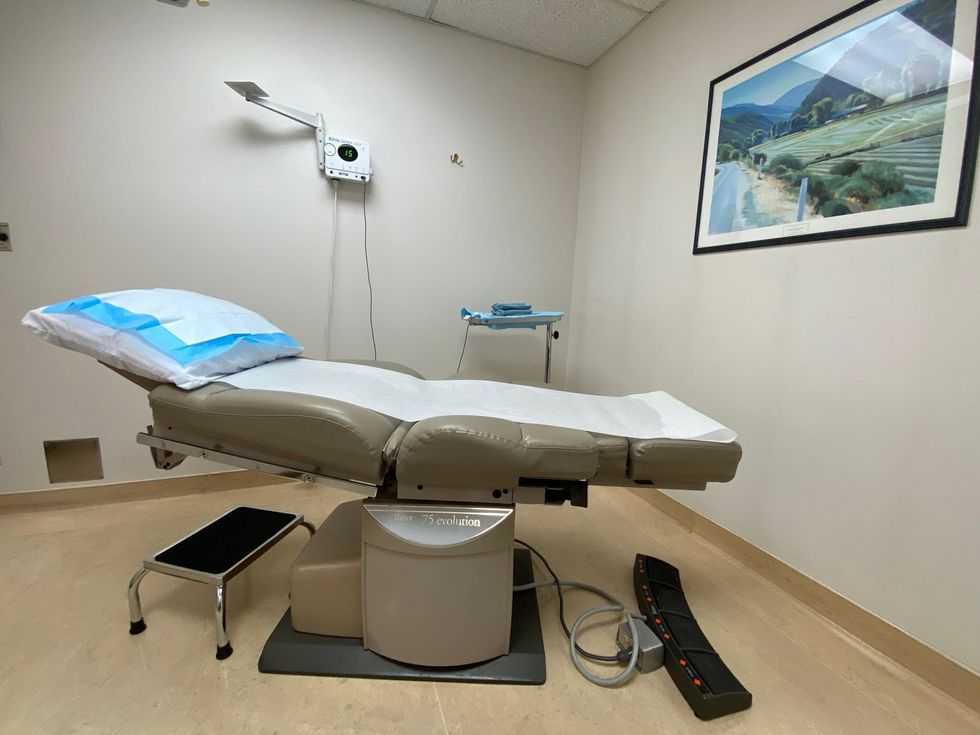I Had Mohs Surgery To Treat Skin Cancer & Here's What Surprised Me Most About The Procedure
It sounds more scary than it is!

A woman having Mohs surgery to have skin cancer removed.
This Opinion article is part of a Narcity Media series. The views expressed are the author's own and do not necessarily reflect the views of Narcity Media.
When I was told I had skin cancer on my face, once the initial shock wore off, my mind immediately went to the treatment options and how the cancer would be removed.
After some research, I went to go see Dr. Bryce Cowan, a plastic and reconstructive surgeon in Vancouver who specializes in Mohs surgery, to have it removed, and the entire procedure really surprised me in the best way possible.
I was diagnosed with basal cell carcinoma, which is the most common type of skin cancer, after noticing a spot on my nose that would bleed when I would rub it with a towel.
Unfortunately, the wait to have the surgery did take several months but the procedure itself was quick and pretty painless.

The reason behind this story is that I myself had so many questions before the treatment and I'm hoping that this will help ease the anxiety of anyone else in the same situation.
From the treatment to the recovery, here's what you can expect with Mohs surgery.
What is Mohs surgery?
Mohs surgery, also known as Mohs micrographic surgery, is a procedure that involves cutting away thin layers of skin to remove skin cancer, according to the Mayo Clinic.
Each thin layer that's removed is tested for cancer and the process is continued until there are no signs of cancer.
Once the removal process is complete, the surgeon will go back and perform reconstruction on the affected area.
How do you prepare for Mohs surgery?
After my consult with the surgeon, I received a list of things I needed to do leading up to the surgery.
The main thing was to stop taking certain medications to prevent excessive bleeding during surgery. I also had to avoid drinking alcohol for three days leading up to the surgery, and they told me to wear comfortable, loose clothing on the day of the procedure.
The instructions are more specific depending on where you're having the surgery.
What does Mohs surgery look and feel like?
I was told Mohs surgery would take anywhere from four to eight hours as each layer of skin that's removed has to be tested in a nearby lab before the surgeon can be assured the cancer is gone. That means that once I left the clinic, I was cancer free.
Since the surgery is long and you're awake during the entire process, it's recommended to bring activities like books and an iPad to help pass the time.
For those who are nervous, don't worry; you are offered a sedative.
What surprised me the most about the procedure is that thanks to the anesthetic they injected into my nose, I didn't feel a thing.
The American Academy of Dermatology Association has a helpful infographic that shows you what to expect from Mohs surgery.
How serious is Mohs surgery?
My doctor told me the surgery is considered very safe.
However, like with every surgery there are some potential, albeit low, risks involved.
The Cleveland Clinic says some of the risks associated with Mohs surgery include scar formation, a larger-than-expected wound, excessive bleeding and infection.
How long does it take to heal from Mohs surgery?
My procedure was done in early April and I'm still healing a month later.
The first step was keeping the area clean and moisturized to help prevent scarring so I had to clean it twice a day and apply an ointment.
A week later I had the stitches removed.
A couple of weeks into the healing process it was recommended to start doing facial massages twice a day for up to three months.
My surgeon told me it could take anywhere from six months to a year for the area to be completely healed.
I've started using silicone patches overnight and I'm hopeful that will help eliminate as much scarring as possible.
Overall, I'm surprised by how quickly and nicely the area is healing.
For anyone looking to have the procedure done, I would tell them the procedure is really less scary than it sounds and you'll be happy to have the peace of mind that your cancer is gone.
This article's cover image was used for illustrative purposes only.